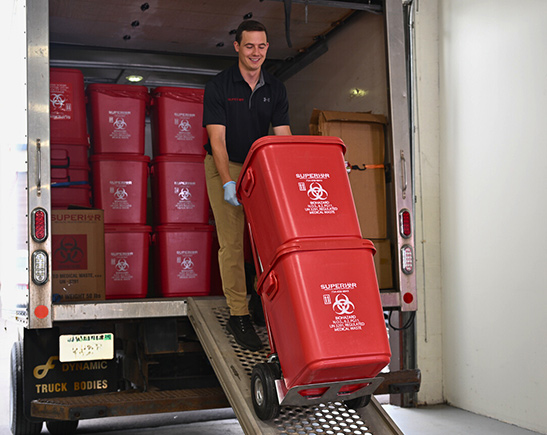Eco-Friendly Waste Disposal Solutions for a Lasting Future
Environmentally friendly waste disposal remedies are not plain alternatives yet imperatives for a sustainable future. From waste segregation at the source to power recovery from waste, a myriad of approaches exist to address the obstacles of waste disposal sensibly.
.jpg)
Waste Segregation at Resource
When carrying out waste partition at resource, individuals can significantly contribute to more efficient recycling and waste monitoring systems. By separating various kinds of waste such as paper, plastic, glass, and natural materials right from the factor of disposal, the procedure of recycling comes to be structured, reducing contamination and raising the value of recyclable products. This technique not just saves resources but additionally reduces the quantity of waste predestined for garbage dumps or incineration.
Proper waste segregation at the resource is necessary for advertising a circular economy where products are recycled, reused, or composted instead of being disposed of as garbage. It also assists in the effective collection and processing of recyclables by waste management centers - medical waste removal service. Neighborhoods that take on waste segregation at the resource often experience expense savings in waste monitoring and see a reduction in environmental contamination
People play a vital duty in the success of waste partition efforts by being mindful of exactly how they get rid of their waste - click here. Education and learning and recognition campaigns can even more motivate the adoption of these techniques, causing a more lasting and green approach to throw away disposal
Composting and Organic Waste Management
An efficient approach for handling organic waste and advertising sustainability is via composting. Composting is an all-natural process that disintegrates natural materials like food scraps, backyard waste, and paper into nutrient-rich soil amendments. This process not only diverts organic waste from land fills however additionally creates a useful product that can enrich dirt, enhance plant development, and reduce the demand for chemical plant foods.

Applying composting programs at the household, area, and local degrees can significantly reduce the quantity of natural waste that winds up in landfills. Educational efforts on composting finest methods and the benefits of organic waste diversion can better encourage extensive fostering of this green waste administration option. click here. Inevitably, composting provides a sustainable and useful method to taking care of natural waste while contributing to a greener and more sustainable future
Recycling and Upcycling Initiatives
One trick facet of promoting green waste management practices is through the application of reusing and upcycling efforts. Furthermore, recycling aids in the conservation of raw products and minimizes the requirement for traditional waste disposal methods like landfilling and incineration.
Upcycling, on the other hand, is the imaginative reuse of thrown out materials or things to produce products of higher quality or value than the original. By upcycling, much less waste is sent out to landfills, and the need for new resources reduces. This sustainable practice advertises advancement and urges people to see waste as an important source.
Both reusing and upcycling initiatives play a vital duty in promoting a round economic situation and decreasing the environmental influence of waste disposal. click here. By incorporating these techniques right into everyday life, people can add to a much more sustainable future for generations ahead
Energy Recovery From Waste

There are numerous technologies used for energy recuperation from waste, including incineration, gasification, and anaerobic digestion. Incineration includes shedding waste at high temperature levels to produce heavy steam, which then drives wind turbines to produce power. Gasification transforms organic materials into synthetic gas, which can be used for electrical power generation or as a fuel source. Anaerobic digestion breaks down organic waste to produce biogas, which can be used for heat or electrical power production.

Community-Based Waste Reduction Programs
Using area involvement and involvement is important in applying efficient waste decrease programs that complement power recovery efforts in lasting waste administration techniques. Community-based waste reduction programs involve joint efforts in between residents, regional companies, and authorities to decrease waste generation and enhance reusing rates. These programs commonly consist of educational projects to increase recognition about accountable garbage disposal description techniques, the relevance of recycling, and the benefits of minimizing waste.
One typical approach is the facility of neighborhood recycling facilities where homeowners can drop off recyclable materials conveniently. These centers promote recycling by making it conveniently obtainable and offering resources for appropriate waste sorting. Furthermore, area clean-up events and area recycling drives help infuse a sense of environmental obligation and unity among residents.
Additionally, community-based waste decrease programs can consist of campaigns such as composting workshops, reusable product exchanges, and the promo of lasting methods in regional services - medical waste disposal. By including the area in waste decrease initiatives, these programs develop a sense of possession and cumulative obligation towards developing a much more sustainable future
Conclusion
To conclude, carrying out environment-friendly garbage disposal options such as waste partition, composting, recycling, power recovery, and community-based programs is essential for a lasting future. By embracing these practices, we can reduce the environmental impact of waste generation and promote a circular economic situation. It is essential that individuals, businesses, and federal governments collaborate to focus on lasting waste management techniques to secure our world for future generations.
From waste partition at the resource to energy recuperation from waste, a myriad of methods exist to deal with the obstacles of waste disposal properly. Educational campaigns on composting best techniques and the benefits of natural waste diversion can even more urge extensive fostering of this environment-friendly waste management remedy.Efficiently using energy from waste products is a pivotal method in sustainable waste monitoring practices.Taking advantage of community interaction and engagement is important in applying effective waste reduction programs that enhance power healing efforts in lasting waste management practices.In final thought, applying environmentally friendly waste disposal options such as waste partition, composting, recycling, power recovery, and community-based programs is important for a lasting future.